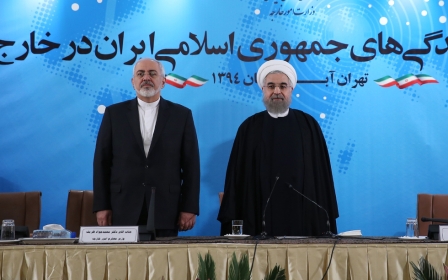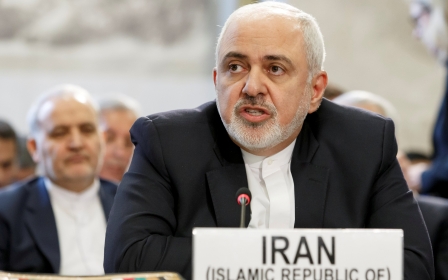Iran's Rouhani rejects resignation of Foreign Minister Zarif

Iranian President Hassan Rouhani has rejected the resignation of Foreign Minister Mohammad Javad Zarif, saying it was against the national interests of the Islamic Republic.
"As the Supreme Leader [Ayatollah Ali Khamenei] has described you a "trustworthy, brave and religious" person in the forefront of resistance against widespread US pressures, I consider accepting your resignation against national interests and reject it," Rouhani said in a letter published on Wednesday on state news agency IRNA.
Zarif attended a ceremony to welcome Armenia's prime minister to Tehran on Wednesday, soon after the president rejected his resignation, the semi-official ISNA news agency reported.
Qassem Soleimani, head of the Quds Force - the extraterritorial branch of the Islamic Revolutionary Guard Corps - also said on Wednesday that Zarif was the main person in charge of foreign policy and he was supported by Khamenei.
"Mr Zarif is in charge of the foreign policy of the Islamic Republic, and has always been supported by the top officials,” Soleimani was quoted as saying by the Fars news agency.
Stay informed with MEE's newsletters
Sign up to get the latest alerts, insights and analysis, starting with Turkey Unpacked
'Inability to continue serving'
On Monday, Zarif had written on his Instagram page that he was resigning, stating: "Many thanks for the generosity of the dear and brave people of Iran and its authorities over the past 67 months."
He gave no specific reasons for his decision, but cited an "inability to continue serving".
An ally of Zarif said on Tuesday that pressure from hardliners over Iran's nuclear deal with world powers had forced him to resign.
Zarif played an important role in striking a 2015 landmark nuclear deal between Iran and six world powers.
But he came under attack by Iranian hardliners after the United States pulled out of the agreement last May and reimposed economic sanctions on some of the country's key industries.
Some Iranian media reports indicated Zarif had resigned over Syrian President Bashar al-Assad's visit to Tehran on Monday, with outlets noting that the foreign minister was not pictured in any of the coverage of the visit.
Threats of bodily harm
On Tuesday, Rouhani had thanked Zarif, along with Iran's oil minister and central bank governor, for being at the frontline of the battle against America in remarks which did not mention the resignation.
Later on Tuesday, Mahmoud Vaezi, Rouhani's chief of staff, posting a photo on Instagram of the two men together.
"In the view of Dr Rouhani, the Islamic Republic of Iran has only one foreign policy and one foreign minister," wrote Vaezi.
Iran's parliament had said it would look into the resignation of Zarif in a meeting on Tuesday, the assembly's news website ICANA reported.
"With attention to the internal and international situation, sanctions and the pressure from America, I emphasize that more than any other time we need internal unity and solidarity," said Ali Najafi Khoshroodi, spokesman for parliament's National Security and Foreign Policy Commission which was holding the meeting.
Earlier on Tuesday, a majority of Iran's parliamentarians had signed a letter to Rouhani asking for Zarif to continue in his job.
Born in 1960, Zarif lived in the US from the age of 17 as a student in San Francisco and Denver, and subsequently as a diplomat to the UN in New York, where he served as Iran's ambassador from 2002 to 2007.
He was appointed minister of foreign affairs in August 2013 after Rouhani won the presidency in a landslide, on a promise to open up Iran to the outside world.
Since taking charge of Iran's nuclear talks with major powers in late 2013, Zarif has been summoned to parliament several times by hardline lawmakers to explain the negotiations.
Some hardliners even threatened Zarif with bodily harm after the nuclear deal was signed.
Middle East Eye delivers independent and unrivalled coverage and analysis of the Middle East, North Africa and beyond. To learn more about republishing this content and the associated fees, please fill out this form. More about MEE can be found here.





